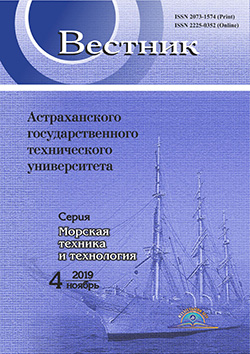Russian Federation
CSCSTI 44.31
CSCSTI 45.01
CSCSTI 55.42
CSCSTI 55.45
CSCSTI 73.34
The article focuses on studying the operational properties of regenerated engine oils in terms of the impact on the wear of friction units of the trunk diesel engine when it works on the fuel of different grades. There have been built generalized models of marine diesel parts wear on the basis of experimental studies. Diesel 2Ч10,5/13 was used for experiments. Wear was determined by the method of artificial bases and by weighting. Four groups of the main indicators of fuels used on ships have been considered (depending on the quality indicator). The first group includes distillate fuels and low-viscosity marine fuel which is close in its characteristics to foreign fuels. The second group includes motor fuel, naval fuel oil and export fuels (medium viscosity fuels). The third group presents high-viscosity marine fuel; the fourth group - fuels made from the remains of oil refining. The description of the generalized model of details wear of the tested diesel engine was carried out by a polynomial of the second order. To obtain the model, a non-position plan was chosen for three test variables: concentration of additives in oil, a fuel quality factor and a level of diesel forcing. The superposition of the hypersurfaces of the response of wear functions of the internal combustion engine with diesel boosting factors at zero, lower, and upper levels with visualizing the effect on engine wear parameters depending on the additives concentration and quality of the fuel used in testing regenerated engine oil has been illustrated. Verification of the model's adequacy has proved that the model is adequate for machines with average effective pressure and a wide range of fuel grades. There has been given the possibility of using the obtained model to estimate the wear value at different values of parametric factors
regenerated motor oil, model of wear, concentration of additives, fuel quality, forcing level, diesel
1. Kicha G. P., Tarasov V. V., Glushkov S. V. Regenerirovanie otrabotannyh motornyh masel i voss-tanovlenie ih ekspluatacionnyh svojstv na sudah [Regeneration of used motor oils and restoration of their operational properties on ships]. Morskie intellektual'nye tekhnologii: sbornik nauchnyh trudov, 2016, no. 3 (33), vol. 1, pp. 126-132.
2. Pikovskaya E. V., Surin S. A. Regeneraciya otrabotannyh masel v SShA [Used oil recovery in US]. Mir nefteproduktov, 2000, no. 4, pp. 23-25.
3. Surin S. A. Otrabotannye masla: vtoraya zhizn' [Used oils: second life]. Mir nefteproduktov, 2000, no. 2, pp. 22-24.
4. Yuzefovich V. I. Organizaciya sbora otrabotannyh smazochnyh masel [Organization of collecting waste lubricating oils]. Mir nefteproduktov, 2001, no. 3, pp. 28-30.
5. Tarasov V. V., Sobolenko A. N. Rekomendacii po glubine ochistki ot mekhanicheskih primesej regeneri-rovannyh motornyh masel raznyh ekspluatacionnyh grupp [Recommendations on depth of purification from mechanical impurities of regenerated motor oils of defferent operational groups]. Morskie intellektual'nye tekhnologii, 2018, no. 4 (42), vol. 5, pp. 110-113.
6. Spiridonov A. A. Planirovanie eksperimenta pri issledovanii tekhnologicheskih processov [Planning ex-periment in study of technological processes]. Moscow, Mashinostroenie Publ., 1981. 184 p.

















